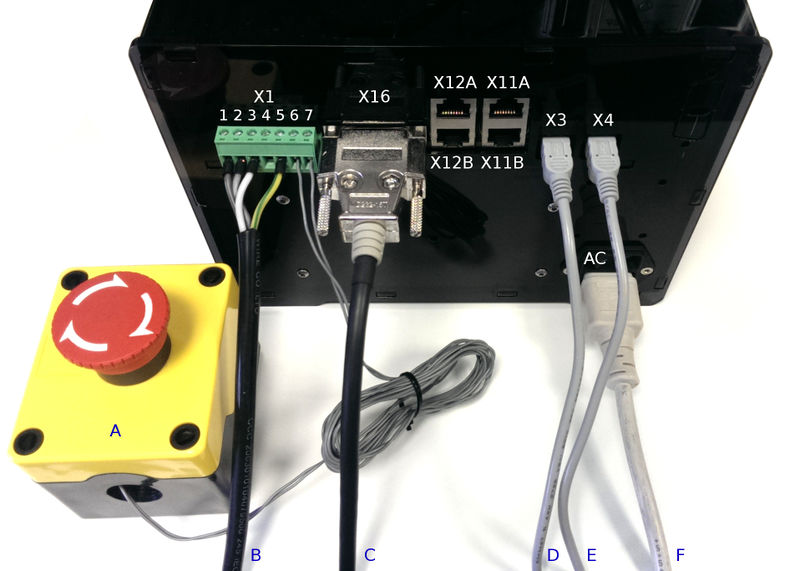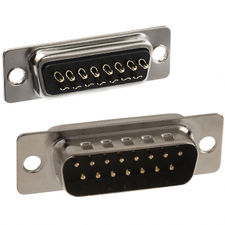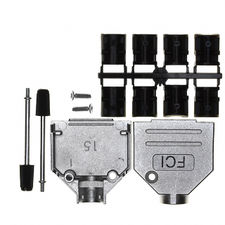Difference between revisions of "Connecting motor to SimuCUBE"
| [checked revision] | [checked revision] |
(→Motor feedback device) |
m |
||
| (11 intermediate revisions by one other user not shown) | |||
| Line 1: | Line 1: | ||
| − | Connecting motor to SimuCUBE involves wiring motor power and [[Feedback devices|Feedback device]] (encoder) to the corresponding connectors. This page instructs making these connections properly. | + | {{SimucubeManualNav}}Connecting motor to SimuCUBE involves wiring motor power and [[Feedback devices|Feedback device]] (encoder) to the corresponding connectors. This page instructs making these connections properly. |
| − | + | ==Overview== | |
| − | + | [[File:simucubeboxcabling_annotated.jpg|thumb|center|800px|Cabling of SimuCUBE, see list of connectors and cables below.]] | |
| + | Connectors and cables of image above: | ||
*X1 - 7 pin terminal for motor power and E-stop | *X1 - 7 pin terminal for motor power and E-stop | ||
*X16 - Motor feedback device/encoder input | *X16 - Motor feedback device/encoder input | ||
| Line 15: | Line 16: | ||
*D - USB to PC (HID/game controller) | *D - USB to PC (HID/game controller) | ||
*E - USB to PC (Granity/IONI configuration) | *E - USB to PC (Granity/IONI configuration) | ||
| − | *F - AC power cord. | + | *F - AC power cord. |
| − | = | + | == Motor power == |
| − | Motor power | + | |
| − | = | + | ===Legend=== |
| − | + | Colors codes in the pin-out tables: | |
| + | {| class="wikitable" | ||
| + | |- | ||
| + | ! Color | ||
| + | |- | ||
| + | | class="powpin" |Supply pin | ||
| + | |- | ||
| + | | class="inpin" |Input pin | ||
| + | |- | ||
| + | | class="outpin" |Output pin | ||
| + | |} | ||
| − | + | Motor power cable consists windings and the protective earth conductors. In 3 phase AC servo motor there are four conductors and they should be connected to X1 terminal block according to the table below: | |
| − | + | ||
{| class="wikitable" | {| class="wikitable" | ||
|- | |- | ||
| − | ! Pin number !! Signal name !! Usage | + | ! Pin number !! Signal name !! Function |
| + | !Usage | ||
|- | |- | ||
| − | | 1 ||class="outpin"| U / PH1|| Motor phase 1 | + | | 1 || class="outpin" | U / PH1|| Motor phase 1 |
| + | |AC servo motor phase U | ||
|- | |- | ||
| − | | 2 ||class="outpin"| V / PH2|| Motor phase 2 | + | | 2 || class="outpin" | V / PH2|| Motor phase 2 |
| + | |AC servo motor phase V | ||
|- | |- | ||
| − | | 3 ||class="outpin"| W / PH3|| Motor phase 3 | + | | 3 || class="outpin" | W / PH3|| Motor phase 3 |
| + | |AC servo motor phase W | ||
|- | |- | ||
| − | | 4 ||class="outpin"| PH4|| Motor phase 4 | + | | 4 || class="outpin" | PH4|| Motor phase 4 |
| + | |Used only with 2-phase stepping motor | ||
|- | |- | ||
| − | | 5|| class="powpin"|GND || | + | | 5|| class="powpin" |GND || Motor protective earth conductor |
| + | |The yellow/green wire | ||
|- | |- | ||
| − | | 6|| class="inpin"|E-Stop / STO || E-Stop switch input (switch | + | | 6|| class="inpin" |E-Stop / STO || E-Stop switch input |
| + | | rowspan="2" |Normall closed (conducting) E-Stop switch goes between pins 6 and 7 | ||
|- | |- | ||
| − | | 7|| class="powpin"|+5 V || | + | | 7|| class="powpin" |+5 V || 5 VDC output (max 100 mA) |
|} | |} | ||
| − | + | Refer your motor manufacturer's data sheet/specifications to identify wire colors of U, V and W phases. | |
| − | + | ||
| − | + | ||
| + | == Motor feedback device == | ||
| + | Feedback device (in this case position sensor, usually encoder) need to be connected to SimuCUBE X16 input. X16 connector type on SimuCUBE is ''D-Sub 15 pin female with two pin rows'', so the mating part is ''D-Sub 15 pin male connector with two pin rows''. | ||
| + | |||
| + | |||
| + | |||
| + | === Case A: pre-made encoder cable === | ||
| + | If you have a motor that comes with pre-made encoder cable with SimuCUBE, [[IONI Servo & Stepper Drive|IONI]] or [[ARGON]] compatible connector, then simply plug this connector to SimuCUBE X16. | ||
| + | |||
| + | === Case B: make encoder connection === | ||
| + | [[File:dsub15male2row.jpg|thumb|225px|right|Mating X16 connector to SimuCUBE (D-Sub 15 pins, male, 2 rows, with solder cups)]][[File:dsub15hood.jpg|225px|thumb|D-Sub connector hood (15 pin size, 4-40 threaded screws)]]If motor encoder cable comes with bare wire ends, or with incompatible connector, then soldering a D-Sub connector with SimuCUBE pin-out is necessary. | ||
{| class="wikitable" | {| class="wikitable" | ||
|- | |- | ||
! Pin # !! Pin name !! Electrical type (in most feedback device modes) | ! Pin # !! Pin name !! Electrical type (in most feedback device modes) | ||
|- | |- | ||
| − | | Shell||class="powpin"|GND|| | + | | Shell|| class="powpin" |GND||Cable shield |
|- | |- | ||
| − | | 1||class="inpin"|HALL_W||Hall sensor digital input W (optional) | + | | 1|| class="inpin" |HALL_W||Hall sensor digital input W ''(optional)'' |
|- | |- | ||
| − | | 2||class="inpin"|HALL_V||Hall sensor digital input V (optional) | + | | 2|| class="inpin" |HALL_V||Hall sensor digital input V ''(optional)'' |
|- | |- | ||
| − | | 3||class="inpin"|HALL_U||Hall sensor digital input U (optional) | + | | 3|| class="inpin" |HALL_U||Hall sensor digital input U ''(optional)'' |
|- | |- | ||
| − | | 4||class="powpin"|GND||Encoder supply ground / 0 V | + | | 4|| class="powpin" |GND||Encoder supply ground / 0 V |
|- | |- | ||
| − | | 5||class="inpin"|B-||Encoder differential input B- | + | | 5|| class="inpin" |B-||Encoder differential input B- |
|- | |- | ||
| − | | 6||class="inpin"|B+||Encoder differential input B+ | + | | 6|| class="inpin" |B+||Encoder differential input B+ |
|- | |- | ||
| − | | 7||class="inpin"|A-||Encoder differential input A- | + | | 7|| class="inpin" |A-||Encoder differential input A- |
|- | |- | ||
| − | | 8||class="inpin"|A+||Encoder differential input A+ | + | | 8|| class="inpin" |A+||Encoder differential input A+ |
|- | |- | ||
| − | | 9|| class="powpin"|5V_OUT||Encoder supply +5 V output | + | | 9|| class="powpin" |5V_OUT||Encoder supply +5 V output |
|- | |- | ||
| − | | 10|| class="powpin"|GND ||Encoder supply ground / 0 V | + | | 10|| class="powpin" |GND ||Encoder supply ground / 0 V |
|- | |- | ||
| − | | 11|| class="inpin"|GPI3|| no connection | + | | 11|| class="inpin" |GPI3|| ''no connection'' |
|- | |- | ||
| − | | 12|| class="inpin"|GPI2|| no connection | + | | 12|| class="inpin" |GPI2|| ''no connection'' |
|- | |- | ||
| − | | 13|| class="inpin"|GPI1|| no connection | + | | 13|| class="inpin" |GPI1|| ''no connection'' |
|- | |- | ||
| − | | 14|| class="inpin"|C-||Encoder differential input C- | + | | 14|| class="inpin" |C-||Encoder differential input C- |
|- | |- | ||
| − | | 15||class="inpin"| C+||Encoder differential input C+ | + | | 15|| class="inpin" | C+||Encoder differential input C+ |
|} | |} | ||
| − | === | + | In the table above, A, B, and C indicate the quadrature encoder differential signals. C channel is often also denoted as Z, Index or IDX. Refer your motor manufacturer's data sheet/specifications to identify wire colors for encoder signals. Pay extra attention to 5V and GND wiring as miswiring these may cause permanent damage to the encoder. |
| − | + | ||
| − | + | ==== Making encoder connector ==== | |
| − | + | List of needed items & skills for making the encoder connector: | |
| − | + | * D-Sub connector and connector hood, see [[List of D-Sub 15 pin connector parts]] | |
| − | + | * Wire cutters & wire stripping tools | |
| − | + | * Soldering iron | |
| − | + | * Soldering skills | |
| − | + | * Motor manufacturer's data sheet where wire colors and signals are specified | |
| − | + | ||
| − | + | {{next|[[Installing MMos firmware into SimuCUBE]]}} | |
| − | |} | + | __NOTOC__ |
[[Category:SimuCUBE_user_guide]] | [[Category:SimuCUBE_user_guide]] | ||
Latest revision as of 12:58, 28 February 2018
Connecting motor to SimuCUBE involves wiring motor power and Feedback device (encoder) to the corresponding connectors. This page instructs making these connections properly.Overview[edit | edit source]
Connectors and cables of image above:
- X1 - 7 pin terminal for motor power and E-stop
- X16 - Motor feedback device/encoder input
- X3 - USB connector (HID/game controller)
- X4 - USB connector (Granity/IONI configuration)
- AC - 110-240 VAC power inlet
- X12A & X12B - External button inputs (optional)
- X13A - Pedal inputs (optional)
- X11B - External analog inputs (optional)
- A - E-Stop (normally closed/conducting switch)
- B - Motor power cable
- C - Motor encoder cable
- D - USB to PC (HID/game controller)
- E - USB to PC (Granity/IONI configuration)
- F - AC power cord.
Motor power[edit | edit source]
Legend[edit | edit source]
Colors codes in the pin-out tables:
| Color |
|---|
| Supply pin |
| Input pin |
| Output pin |
Motor power cable consists windings and the protective earth conductors. In 3 phase AC servo motor there are four conductors and they should be connected to X1 terminal block according to the table below:
| Pin number | Signal name | Function | Usage |
|---|---|---|---|
| 1 | U / PH1 | Motor phase 1 | AC servo motor phase U |
| 2 | V / PH2 | Motor phase 2 | AC servo motor phase V |
| 3 | W / PH3 | Motor phase 3 | AC servo motor phase W |
| 4 | PH4 | Motor phase 4 | Used only with 2-phase stepping motor |
| 5 | GND | Motor protective earth conductor | The yellow/green wire |
| 6 | E-Stop / STO | E-Stop switch input | Normall closed (conducting) E-Stop switch goes between pins 6 and 7 |
| 7 | +5 V | 5 VDC output (max 100 mA) |
Refer your motor manufacturer's data sheet/specifications to identify wire colors of U, V and W phases.
Motor feedback device[edit | edit source]
Feedback device (in this case position sensor, usually encoder) need to be connected to SimuCUBE X16 input. X16 connector type on SimuCUBE is D-Sub 15 pin female with two pin rows, so the mating part is D-Sub 15 pin male connector with two pin rows.
Case A: pre-made encoder cable[edit | edit source]
If you have a motor that comes with pre-made encoder cable with SimuCUBE, IONI or ARGON compatible connector, then simply plug this connector to SimuCUBE X16.
Case B: make encoder connection[edit | edit source]
If motor encoder cable comes with bare wire ends, or with incompatible connector, then soldering a D-Sub connector with SimuCUBE pin-out is necessary.| Pin # | Pin name | Electrical type (in most feedback device modes) |
|---|---|---|
| Shell | GND | Cable shield |
| 1 | HALL_W | Hall sensor digital input W (optional) |
| 2 | HALL_V | Hall sensor digital input V (optional) |
| 3 | HALL_U | Hall sensor digital input U (optional) |
| 4 | GND | Encoder supply ground / 0 V |
| 5 | B- | Encoder differential input B- |
| 6 | B+ | Encoder differential input B+ |
| 7 | A- | Encoder differential input A- |
| 8 | A+ | Encoder differential input A+ |
| 9 | 5V_OUT | Encoder supply +5 V output |
| 10 | GND | Encoder supply ground / 0 V |
| 11 | GPI3 | no connection |
| 12 | GPI2 | no connection |
| 13 | GPI1 | no connection |
| 14 | C- | Encoder differential input C- |
| 15 | C+ | Encoder differential input C+ |
In the table above, A, B, and C indicate the quadrature encoder differential signals. C channel is often also denoted as Z, Index or IDX. Refer your motor manufacturer's data sheet/specifications to identify wire colors for encoder signals. Pay extra attention to 5V and GND wiring as miswiring these may cause permanent damage to the encoder.
Making encoder connector[edit | edit source]
List of needed items & skills for making the encoder connector:
- D-Sub connector and connector hood, see List of D-Sub 15 pin connector parts
- Wire cutters & wire stripping tools
- Soldering iron
- Soldering skills
- Motor manufacturer's data sheet where wire colors and signals are specified
| Read next |


